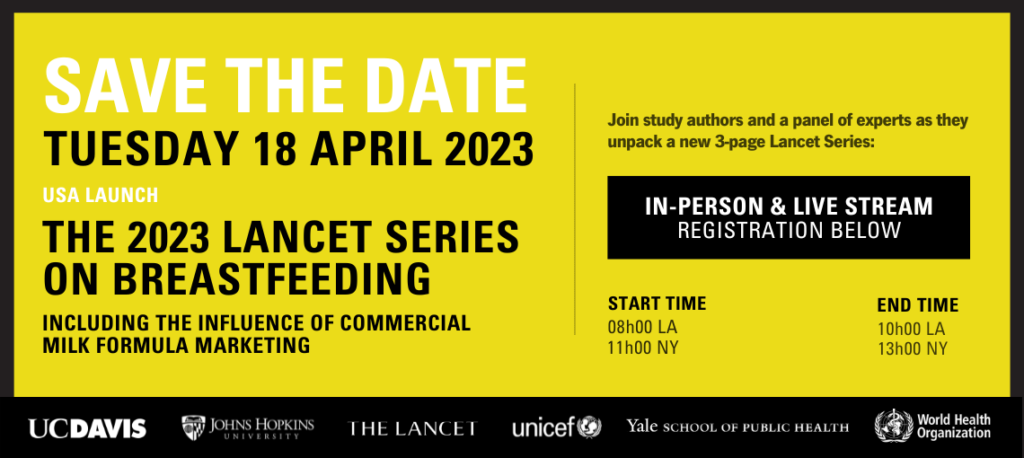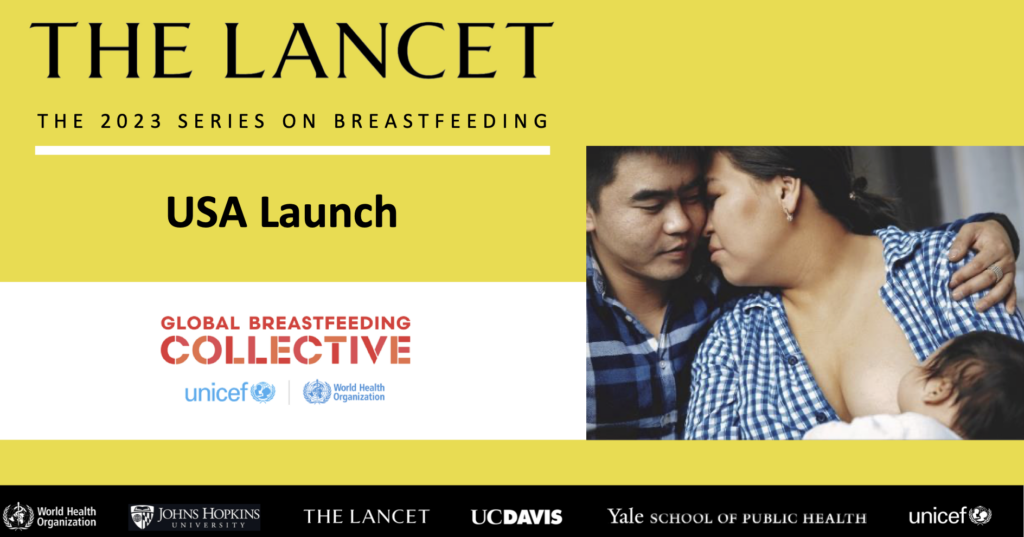Editors Note: This post was originally published on April 15, 2023, in anticipation of the USA Launch. It has been updated to include key points from the webinar and the link to the recordings and handout.
Human milk feeding is essential for optimal growth and development in infants and young children. However, less than half of infants worldwide are chestfed/breastfed, and this trend is happening across low-wealth and high-wealth countries. One of the major reasons for this is the aggressive marketing tactics of formula companies to sell infant formula as a substitute for human milk.
We all are susceptible to marketing. It has a significant impact on our purchasing decisions, and marketing influences the decisions that public health institutions, governments, and other policymakers make, as well as those of the family or individual. The 2023 Lancet series on formula marketing continues to shed light on the highly effective strategies used by commercial formula manufacturers to target parents, healthcare professionals, and policymakers. The series explores how public health and government policies have abandoned the health and development of infants and young children to formula marketers who promote infant behaviors to encourage formula use.
The USA Launch of the 2023 Lancet Series on Breastfeeding was an examination of the impact of commercial milk formula marketing on infant feeding globally and in the United States. Breastfeeding matters for the health and development of our youngest community members; yet, “over the past 20 years, practices have changed and, globally, fewer than half of all infants are fed according to WHO recommendations.” Key points included:
- Breastfeeding success is a collective responsibility that depends on multifaceted policy and societal responses – it is not the sole responsibility of women
- Infant behaviours e.g., sleep and crying, have normal trajectories – same as learning to walk or to speak – and can be misinterpreted as hunger etc. or re-framed as ‘abnormal’ to promote artificial solutions
- Misreading the infant’s cues may lead to Self-Reported Insufficient Milk
- Self-reported insufficient milk is the reason that a third of mothers stop breastfeeding
- Commercial milk formula marketing influences our beliefs, values and practices – it has changed the infant feeding ecosystem – and its extent and power has not been fully appreciated by most in health, civil society and government
- In this report, commercial milk formula (CMF) replaces breast milk substitute “[t]o highlight the artificial and ultra-processed nature of formula products and to avoid using the term “substitute”, which “conveys the notion of equivalence'”
- CMF marketing has been very successful over the decades in reshaping individual, societal and medical norms and values, and we need a systems approach…to address the CMF playbook
- It is the responsibility of governments to implement structural interventions/policies to support breastfeeding and mitigate negative, undermining influences
- There are implications of the Series for the United States, where families face barriers and inequities in hospital practices, insurance coverage, and access to paid parental leave; widespread exposure to formula marketing; and a vulnerable first food system.

“The study authors and a panel of experts unpacked a new 3-paper Lancet Series:
- Understanding normal infant behaviours, feeding practices and multisectoral interventions to support breastfeeding
- The commercial milk formula marketing ‘playbook’
- Power, political and economic structures and their impact on infant feeding, health and human rights”
Formula marketing tactics are insidious, ranging from selling sleep (e.g., your baby will sleep better if you use formula) to peace of mind (e.g., you know how much your child is receiving). These tactics are designed to convince parents that formula is an equivalent or even better option than breastfeeding. The impact of these marketing strategies is not limited to parents, as they also influence the decisions of public health institutions, governments, and policymakers.
The lack of paid leave protection in many countries, including the USA, further undermines breastfeeding rates. Only 12% of countries worldwide provide adequate paid maternity leave, according to a report by UNICEF. This lack of support for nursing families makes it difficult for parents to achieve their breastfeeding goals.
Breastfeeding is the best option for babies, and our communities need to support families to achieve this goal. National, regional, state, and local policies that promote and support breastfeeding, chestfeeding, and human milk feeding are crucial for the optimal health and growth of our children. We need to continue to raise awareness of the marketing tactics of formula companies as we work towards creating breastfeeding-friendly communities.
For further reading, we recommend the following articles:
- “Breastfeeding 2023 Series from the Lancet journals” (https://www.thelancet.com/series/breastfeeding-2023)
- “Launch of the 2023 Lancet Series on Breastfeeding, including the influence of commercial milk formula marketing” February 2023 (https://www.who.int/news-room/events/detail/2023/02/08/default-calendar/launch-of-the-2023-lancet-series-on-breastfeeding–including-the-influence-of-commercial-milk-formula-marketing)
- “Selling second best: how infant formula marketing works” (https://globalizationandhealth.biomedcentral.com/articles/10.1186/s12992-020-00597-w)
- “How formula companies continue to thwart breastfeeding” (https://www.statnews.com/2023/02/08/formula-companies-thwart-breastfeeding/)
- “Marketing of breast-milk substitutes: status report 2020” (https://www.unicef.org/reports/marketing-of-breast-milk-substitutes-status-report-2020)
- “Countries failing to stop harmful marketing of breast-milk substitutes, warn WHO and UNICEF” (https://www.who.int/news/item/27-05-2020-countries-failing-to-stop-harmful-marketing-of-breast-milk-substitutes-warn-who-and-unicef)
- “More than half of parents and pregnant women exposed to aggressive formula milk marketing – WHO, UNICEF” (https://www.who.int/news/item/22-02-2022-more-than-half-of-parents-and-pregnant-women-exposed-to-aggressive-formula-milk-marketing-who-unicef)
- Baby formula marketing ‘pervasive, misleading and aggressive’ – UN report (https://news.un.org/en/story/2022/02/1112452)
- Why family-friendly policies are critical to increasing breastfeeding rates worldwide – UNICEF (https://www.unicef.org/turkiye/en/press-releases/why-family-friendly-policies-are-critical-increasing-breastfeeding-rates-worldwide)

